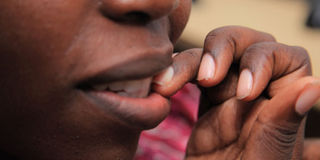Biting your nails is more than just a bad habit

Any successful treatment of onychophagia requires the cooperation of the person who is biting their nails, along with positive reinforcement and routine follow-ups. Photo by Rachel Mabala
Nail biting is not only a dirty habit but is also harmful to your health. Also known as Onychophagia, this habit has been classified as a psychological disorder which can be genetically inherited. Dr Edward Mugisha, a general physician, notes that this behaviour starts from childhood and if not checked, intensifies in adulthood.
“Children who suck their thumbs in childhood are also likely to bite their nails too. It is used as coping mechanism when the child is experiencing anxiety, stress, tension, or boredom,” Dr Mugisha explains.
Infection
“The commonest disadvantage of biting nails is the physical deformity it causes. You have probably seen people whose nails have been bitten in half leaving behind unsightly ridges or wounds. These wounds can result into a nail infection known as paronychia. Also once these ridges form they prevent new nails from growing,” he adds.
According to Dr Mugisha, our hands are germ infested due to all the bacteria they come in contact with, when one bites their nails; they are transferring all that bacteria into their mouths.
Even if you wash your hands frequently, it is not possible to get rid of all the germs and dirt from under your nails. Once the germs that were under your fingernails get into your body, your chances of illness increase significantly.
Halitosis
Dr Hamidu Kibuku, a dentist, notes that nail biting does not just deform the teeth but also causes halitosis (a persistent, unpleasant odour) because of the bacteria transferred into the mouth that infect or cause irritation, to the gums.
“A common symptom of people who bite their nails is chipped front teeth and damaged enamel. Also biting your nails can cause your teeth to shift out of place,” Kibuku says. Using your teeth to groom your nails is dangerous because it is not as accurate as a nail cutter or scissors. The constant biting can leave the skin around the nails torn to shreds resulting into what is known as a hangnail.
According to medical website Medical News Today, hangnails are open sores that can easily become infected. The best way to avoid the painful sores is to prevent the hangnail from forming in the first place by moisturising regularly; and not chewing on your fingers. Most ingrown nails occur on the toenails, but biting your nails can cause your nails to grow under your skin in your fingers too. Ingrown nails can cause pain and swelling and potentially lead to infection and require surgery.
Stunted growth
According to the insider.com, biting your nails down too far is not just a bad look that lasts a couple of days, it can lead to permanent damage.
Onycholysis, the separation of the fingernail from its nail bed, is a common nail disorder.
And for those who bite their nails, the condition is more likely to become irreversible and cause a shrinking or “disappearing” nail bed, according to a 2005 study.
How to stop
Barrier-type interventions that block contact between the mouth and nails, such as gloves, mittens, socks, and retainer-style or bite-plate devices can serve as impediments to biting or reminders not to bite.
Treatment in severe cases must also focus on reducing or removing the emotional factors associated with nail biting.




